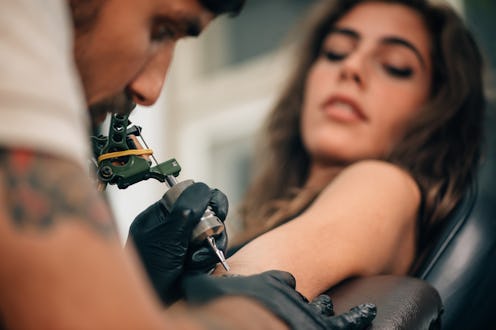Life
7 Signs Your Tattoo May Be Leading To Inflammation

Tattoos don't just sit under your skin, they actually continue to interact with your body's chemistry throughout the course of your life. So if you're having any problems with your tattoo, the chances are pretty high that it's due to inflammation. The risks of tattoos vary from person to person, but can be quite serious if your body reacts aversely to what it interprets as a foreign material.
The immune system is the secret to tattoos permanence. Basically, your body realizes that the ink of a tattoo isn't something it produces itself, and is engaging in a constant immune reaction. This, when even slightly awry, can cause acute inflammation.
"When tattoo pigment is injected into the skin it is recognized as something foreign," dermatologist Susan Bard, MD, tells Bustle. "Specific immune cells called macrophages ingest the foreign pigment in an attempt to contain and destroy it [... walling it off, and allowing] it to be tolerated by the rest of the immune system. But that's not always the case, and often times people do have a reaction to the tattoo trauma or ink." If you have a compromised immune system, an allergic reaction, or a specific medical issue, then the chances of your body struggling to properly handle the ink increase. When this happens, you may experience signs of inflammation.
Here are seven signs your tattoo may be leading to inflammation, according to experts.
1You Have An Infection
If you didn't properly clean the tattoo site before tattooing, or have experienced another small issue that could lead to infection, this infection can cause some painful — and even dangerous — inflammation.
"The most common localized skin infections within a fresh tattoo is a staph aureus skin infection that occurs due to secondary infection of the needled sites," board-certified dermatologist Tsippora Shainhouse, MD, FAAD, tells Bustle. "It can cause a weeping, blistered or pustular rash, or a single painful abscess." If you're experiencing this sign of inflammation, it's important to go to a doctor to have the infection be treated right away.
2You Have An Allergic Reaction To Antibiotic Ointment
Developing a habit of using too much antibiotic ointment (like Neosporin or Polysporin) after getting a tattoo can increase the risk of inflammatory tattoo complications.
"Contact allergic dermatitis can occur due to the topical antibiotic ointment applied after the tattoo process," Dr. Shainhouse says. "[...] It is best to keep the area clean with soap and water and apply plain Vaseline until it is healed up. This reaction is usually confused for an infection and should be seen by your doctor if it occurs." While you still need a doctor's input, if the inflammation clears up a bit by using less ointment, then you may be able to tell that the reaction is starting there.
3You Have An Allergic Reaction To Tattoo Ink
Another issue that can cause inflammation after you get a tattoo is having an allergic reaction to tattoo ink.
"Contact allergic dermatitis can also occur due to the actual tattoo ink," Dr. Shainhouse says. "Red and yellow ink are the most common ones to cause this reaction." Raised pink bumps or scaly skin patches within a specific color section of your tattoo are a sign that the inflammation may be caused by an ink allergy. Like other reactions, this requires the help of a doctor to treat.
4You Develop Granulomas
Granulomas are a form of skin inflammation, and can happen after you get a tattoo. Both tattoo ink and the trauma of getting a tattoo itself can cause this reaction.
"In patients with certain underlying autoimmune and inflammatory conditions or tendencies, tattooing can actually trigger a lump of inflammation in the skin, called a granuloma," Dr. Shainhouse says. Dr. Shainhouse suggests managing this with injected or topical steroids, prescribed by a doctor.
5You Notice Keloids
If you've had firm raised scars in the past, then you've already experienced your body's inflammatory response to skin trauma — in the form of a keloid.
"Patients with the predisposition towards keloiding may develop keloids at the site of a tattoo due to the trauma," Dr. Bard says. "The immune system has been shown to play a role in this overreaction of the normal healing response." If you are concerned about having this reaction to a tattoo, it's important you see a dermatologist.
6You Develop Pus Or Pustules
Pus or pustules are another sign of inflammation caused by tattoos. These reactions are very important to look out for.
"This can be caused by unsterile instruments or ink, or unsterile technique, allowing infection to enter through the new tiny little holes that were created by tattooing," Dr. Bard says. Research ahead of time into the tattoo artist can help prevent this, but afterwards only a medical professional will help you be able to get rid of this reaction.
7You Experience A Psoriasis Flare
Not all inflammatory responses to tattoos are hard to predict. If you have certain existing medical conditions, like psoriasis, you may be able to anticipate this sort of reaction.
"In those prone to psoriasis the trauma of a tattoo can trigger a flare in the area," Dr. Bard says. "It's the repeated trauma from the tattoo needle that actually triggers the immune reaction responsible for the psoriasis flare." This immune reaction causes inflammation. If you have, or suspect you have, psoriasis, then you may want to discuss your desire to get a tattoo with your dermatologist.
For most people, with or without pre-existing immune system issues, inflammatory reactions to tattoos tend to be acute and treatable. These reactions may look scary, because they happen so visibly on the skin, but they are largely something that doctors have experience taking care of. As long as you seek help if you notice any changes to your health after getting a tattoo, you'll likely be just fine — even if you experience a bit of inflammation.